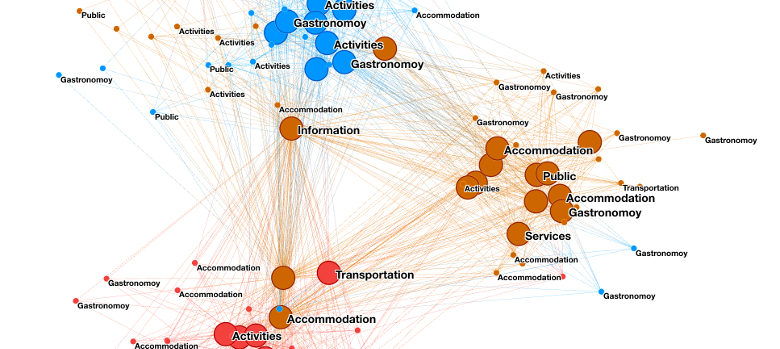Resilience to climate change in a cross-scale tourism governance context: a combined quantitative-qualitative network analysis
Can the resilience of place-based social-ecological systems (SES) in isolated geographies be measured, and at what governance scale should communities and regions be governed for high resilience?

Fig 2. Luthe and Wyss 2016
As part of the larger ArcAlpNet project, a recent paper by Tobias Luthe and Romano Wyss (which is part of the PECS special issue in Ecology and Societyexternal link) sheds some light on the resilience of the three Swiss Alpine communities Andermatt, Disentis and Sedrun to fast and gradual climate change. By applying a quantitative social network analysis (SNA) approach, the collaborative networks of all economic and public actors in these tourism-dependent communities are assessed, analyzed and visualized. The authors then compare these data with a planned destination management organization (DMO) as a governance entity of the same three municipalities on the regional scale.
This approach to quantifying resilience of SES stems from a network governance perspective: systems are more resilient if their components and connections are more diverse to prepare for change, e.g. gradual types of climate change, and if they are more flexible to respond to change, i.e. fast types of climate change.
System properties of diversity and flexibility can be expressed with network metrics. The authors provide an overview table summarizing the literature on network metrics and their interpretation for resilience. Based on this, they interpret the derived metrics of the three communities and their DMO entity on the regional governance scale for resilience. The paper then validates the interpretations with qualitative data derived from personal interviews and workshops, and thereby contributes to the establishment of network metric interpretations for resilience assessment.
Results indicate higher resilience of the regional DMO scale because of a more flexible and diverse governance structure, more centralized steering of fast collective action, and improved innovative capacity, because of higher modularity and better core-periphery integration. Adaptation of communities to gradual climate change should be dealt with at a regional governance scale and adaptation to sudden changes at a municipal scale. Overall, DMO building at a regional scale may enhance the resilience of municipalities, if they are well integrated.
